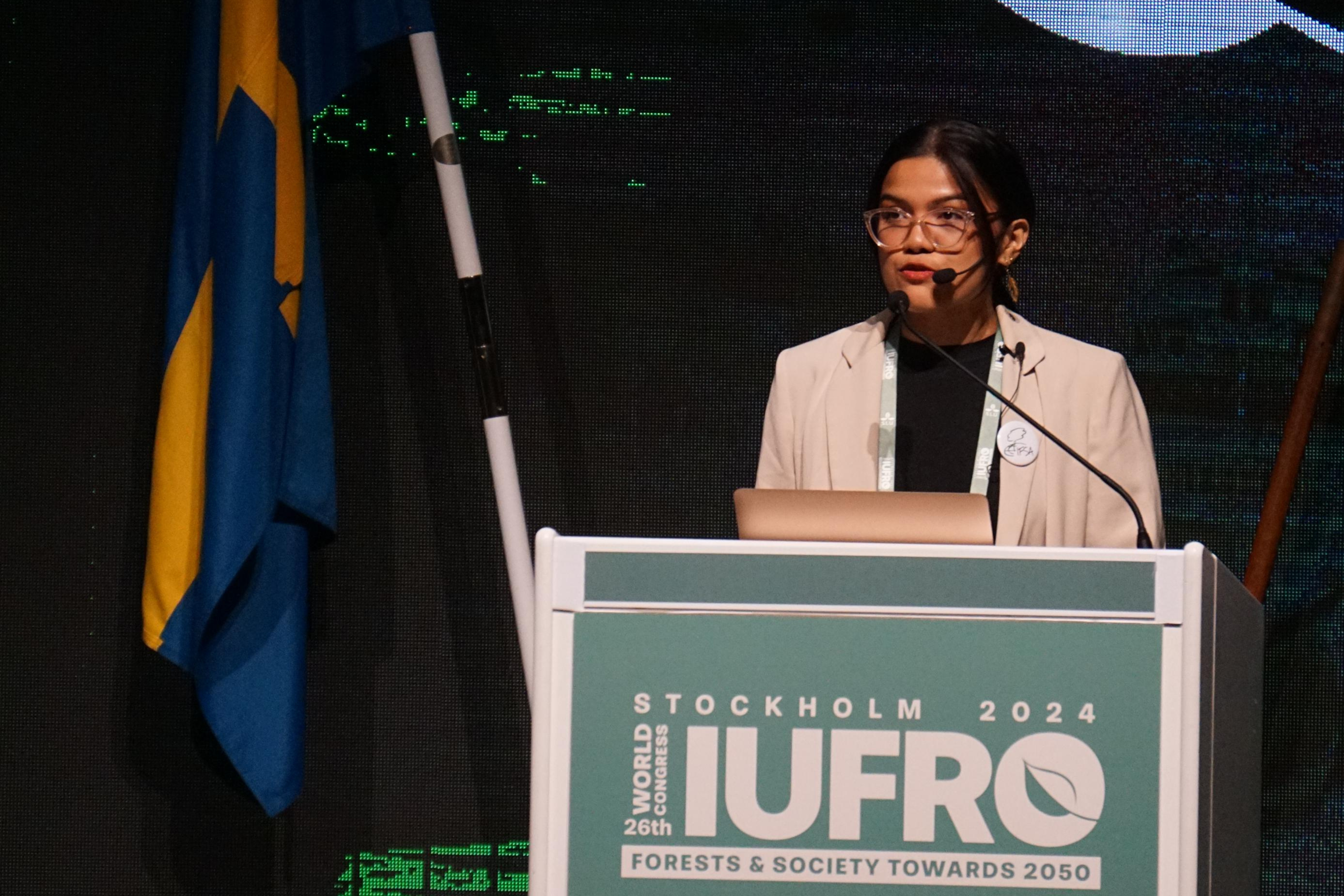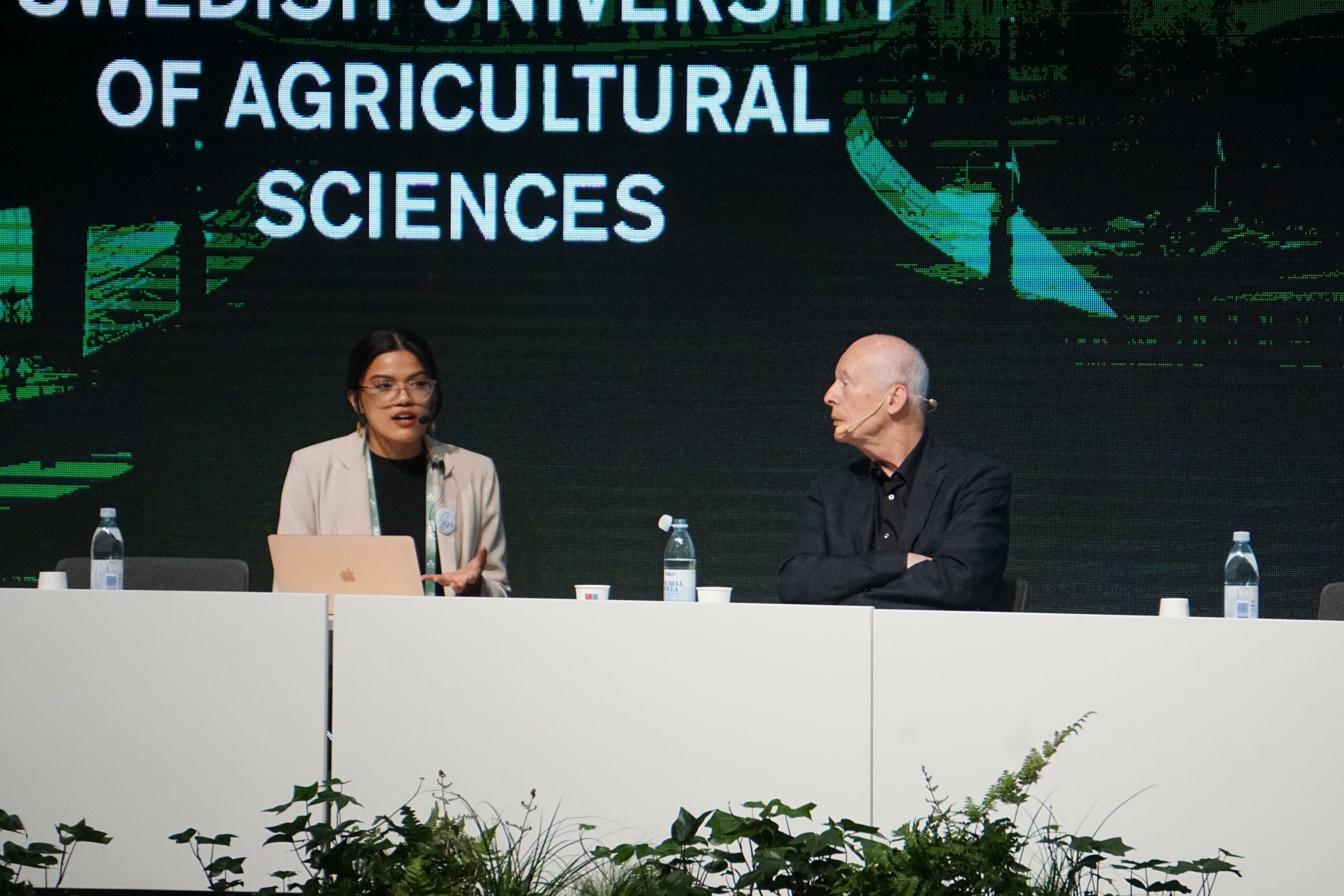IFSA Championing Forestry Education with School Forest Project at #IUFRO2024
An article by Isabelle Claire Dela Paz
One of IFSA’s goals is to become a leader in shaping forestry education. As an association, we understand the value of promoting forestry education to young people and how it influences the trajectory of sustainable forestry. This is why we connect, empower, and educate the next generation of leaders in these sectors.
The 26th IUFRO World Congress from the 23rd to the 29th of June 2024 in Stockholm, Sweden was a powerful platform for IFSA and the youth to showcase our value as collaborators and leaders in forestry. More than 20 IFSA delegates and I participated in the Congress to learn from a worldwide network of students, scientists, and professionals from forestry and related sciences and, most importantly, share our individual and collective advocacies.

Photo credit: Alexander Watson (IFSA)
During the “Forests for the Future” Plenary session on 29 June, I had the honor to share the stage with Hans Joachim Schellnhuber and Jens Peter Skovsgaard as a speaker and present about the current state of forestry education and IFSA’s efforts to address this issue.
“We do not have enough access to educational resources that will help us become competent in our fields.”
Forestry education has been missing from the global forest policy agenda, triggering inadequate curricula and related policies; lack of training and employment opportunities; and society’s changing perception and interest towards forestry. Because of this, we do not have enough access to educational resources that help us develop our professional competencies.
Among many of our forestry education initiatives, I highlighted TreE-Learning—our online learning platform catering to students’ needs for soft and technical forestry skills development—and its potential to influence younger students’ perception of forestry through the IFSA-School Forest Project, in collaboration with the Forests for Tomorrow Foundation and the Gymnasium Carolinum Neustrelitz.
The essence of the IFSA-School Forest Project
Online forestry education is often perceived as an ineffective supplementary learning resource for students, relative to on-ground, field activities. In reality, it is an effective tool for providing cutting-edge alternative delivery methods, complementing traditional classroom activities, and enhancing students’ skills in communication, computer, media competency, and self-motivation.
The IFSA-School Forest Project is a pilot project in collaboration with the Forests for Tomorrow Foundation and the Gymnasium Carolinum Neustrelitz integrating the TreE-Learning platform into the activities of secondary school students from Neustrelitz, Germany. Through this project, we assessed the platform’s effectiveness as a supplementary learning resource and provided recommendations to improve its implementation in the future.
My fellow IFSA member, Alexa Beaucamp, initiated and led the School Forest Project. We conceptualized our collaboration plan during the International Forestry Students’ Symposium (IFSS) last year and signed the Letter of Agreement at the Climate Change COP 28 in Dubai in December 2023.
Outcomes of the project
Forty-six Grades 9 and 10 students from Neustralitz, Germany participated in the pilot project by learning about Community Forestry in Asia through the TreE-Learning platform. Before and after completing the module, the students answered pre- and post-tests as a way for the Project team to compare their scores and assess the overall effectiveness of the platform on their learning.
The project results showed a significant improvement in the students’ understanding and interest in the topic. However, improvements need to be made to the modules and overall platform to increase its effectiveness—this includes simplifying technical forestry terms and diversifying module topics and language options.
Looking ahead to the future of forestry education
Beyond the technical aspects of project improvements, IFSA is committed to collaborating with our stakeholders for similar initiatives to achieve our common goal of enhancing forestry education and propagating knowledge for the younger generations. This could be through technical guidance or consultation, financial support, or other kinds of collaboration to enable us to upscale our initiatives and deepen our impact.

Photo credit: Alexander Watson (IFSA)
It was also encouraging to see the audience members interact with John and me during the question-and-answer portion of the session. Different experts from the field provided their insights on broadening the focus of our educational initiatives beyond forests to other ecosystems and engaging with policymakers to establish a more holistic approach to forestry education development.
“…Our message for you as the leader of your organization is that you must give us the space to be listened to, collaborated with and invested in…”
As a global youth network, we will continue using our platform to implement capacitating initiatives for the youth and empower them to take action as leaders in the sector. But for us to achieve this, we need the steadfast support and collaboration of our stakeholders to upscale our impact on forestry education.
The plenary session and the Congress, overall, was an eye-opening experience for me to realize the milestones we have reached as an association and the possibilities that we can achieve together in the future. These achievements and opportunities would not have been possible without our long-withstanding partner, the International Union of Forest Research Organizations (IUFRO), who has unwaveringly supported us for more than a decade to help us achieve our goal of becoming the leaders our forests need.
Most importantly, the success of this pilot project was made possible by the brilliance and dedication of my colleagues and friends, Alexa Beaucamp, Alexander Watson, Isa van Lidth de Jeude, and Rafael Luna Reyes. Thank you for all your help!
To my fellow IFSA members and youth, let this project serve as a testament that we have the power to shape the future of the young generations and, of course, our forests.
Watch the complete recording of the “Forests for the Future” plenary session below:
